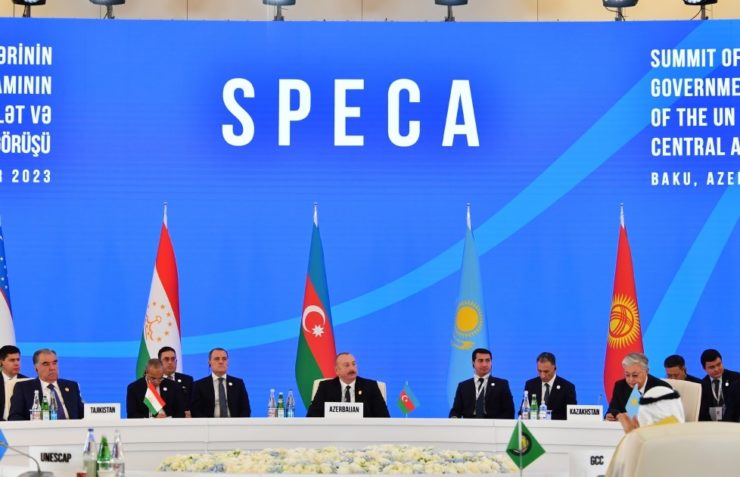
On November 24, 2023, Baku became the center of a newly emerging geopolitical and geo-economic region in Eurasia. The city hosted its first-ever SPECA summit, dedicated to the 25th anniversary of the United Nations Special Program for the Economies of Central Asia (SPECA).
Established in 1998, the United Nations Special Program for the Economies of Central Asia (SPECA) seeks to offer both humanitarian and economic support to Azerbaijan and the Central Asian nations. This program was initiated in 1997 by Kazakhstan, led by then-President Nursultan Nazarbayev, who can be considered one of the key ideologists of expanding interactions in the Eurasian region. The member countries of the program are Azerbaijan, Turkmenistan, Kazakhstan, Kyrgyzstan, Uzbekistan, Tajikistan, and Afghanistan.
The late 1990s was a difficult period in the life of most of the states under the auspices of the program – civil strife continued in Afghanistan, with a new spiral in 1996 with the seizure of power in the country by a well-known group, already recognized as a terrorist group by most countries of the world at that time. The former Soviet republics were likewise going through a difficult period. The countries of the region had barely recovered from the upsurge in interethnic clashes before they faced the consequences of the 1997 Asian economic crisis and the 1998 default by their largest trading partner, Russia. Only a year earlier, the civil war had ended in Tajikistan, and several districts of Azerbaijan had come under foreign control. The program was launched under such difficult conditions. After 25 years, most countries have seen significant improvements in their respective situations. Cooperation between the countries participating in the program has also been strengthened.
The official program of the summit included the keynote “Transforming the SPECA region into a connectivity hub with global outreach,” which served as its motto. On November 24, it should be mentioned that for the first time a summit of the leaders of the member states was held within the framework of SPECA – before that only economic forums were held. The main topic of discussion was the potential for twohe Trans-Caspian International Transport Route to be implemented as a crucial link between China and the European Union, the two major economic centers of Eurasia.
As previously stated, the leaders of all the SPECA nations (except from Afghanistan) attended the meeting; on November 24, the presidents of Kazakhstan, Kyrgyzstan, Tajikistan, Uzbekistan, and Turkmenistan arrived in Baku. Specifically, the first three leaders left for the summit just after the completion of another major Eurasian body, the CSTO meeting, when they met with the presidents of the Russian Federation and Belarus. With regard to Afghanistan’s potential involvement in upcoming summit proceedings, President of Uzbekistan Shavkat Mirziyoyev has urged his colleagues in SPECA to reestablish a relationship with this nation.
The President of Hungary, the Secretary General of the Gulf Cooperation Council (GCC), and the Prime Minister of Georgia all came in Baku on November 24, 2023, as guests of honor to take part in the summit. These positive and cordial discussions with the Azerbaijani leader served as a kind of blueprint for the opportunities that Azerbaijan extends to its Central Asian counterparts. Specifically, it is about the opening of infrastructure and transportation corridors from Central Asia via the Caspian Sea, Azerbaijan, and Georgia to the Black Sea and, respectively, to Europe. Furthermore, Azerbaijan’s successful foreign policy has eliminated mutual territorial issues with Armenia through a military campaign and several agreements. This creates opportunities for the Central Asian republics to boost exports through the Zangezur corridor, where Armenia can play a significant role as well as Turkey with its seaports, located both in the north and south of the country, Meanwhile, fresh investments from the wealthiest Arab nations are promised to the Central Asian republics through the growth of the SPECA-GCC partnership. Realizing all of these advantages will guarantee Azerbaijan’s place in SPECA and other international organizations with somewhat similar participant compositions, particularly the Organization of Turkic States and the Organization for Economic Co-operation and Development, as one of the most economically, politically, and transitively significant nations.
Following the summit in Baku, one of the two “non-Turkic” countries taking part in the program and one of the smallest, Tajikistan, assumed the chairmanship of SPECA. The republic’s active promotion of SPECA projects could serve as a model for other non-Turkic governments to increase their involvement in regional or interregional initiatives.
Thus, the first-ever SPECA summit, held in Baku on November 24, attested to the notable political and economic accomplishments of the nations of Transcaucasia and Central Asia over the previous 25 years, to the mutually beneficial strengthening of their cooperation, to their increasing significance in the transit and geopolitical plans of major extra-regional players, and—perhaps most importantly—to the gradual formation of an institutionalized and interconnected space within Eurasia, predicated on the steady emergence of mutual interest and mutual dependence among the countries of Central and South Asia and Transcaucasia. The most active promotion in this field is going toward projects that involve not only the SPECA nations but also Turkey, Iran, Russia, China, and Pakistan; there is also a possibility that these projects will include Georgia and Armenia (because of their substantial profitability). It is also significant that the leaders of the participating nations have acknowledged the UN’s central role in controlling international political affairs, in contrast to the views of several Western states regarding the propriety of taking unilateral action in international politics and the economy without consulting the UN. Additionally, SPECA has the potential to serve as the primary forum for creating a long-term solution to Central Asia’s “water issue”; the president of Uzbekistan specifically mentioned this during the summit.
Boris Kushkhov, the Department for Korea and Mongolia at the Institute of Oriental Studies of the Russian Academy of Sciences, exclusively for the online magazine “New Eastern Outlook”.
